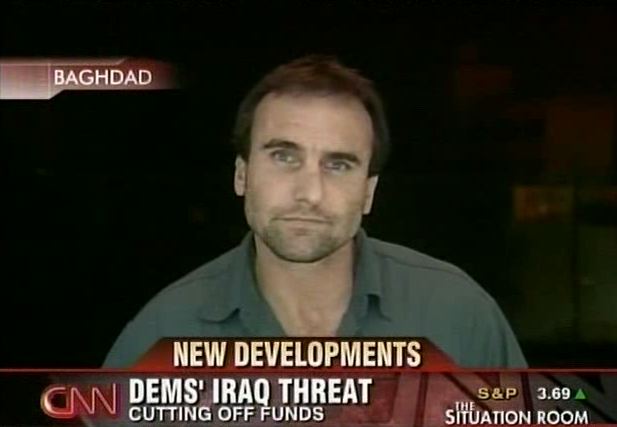TSR: "The policy of containment..."

Click photo to play
Length: 3:32
SUZANNE MALVEAUX: And Senate Majority Leader Harry Reid is promising to bring that bill cutting off most of Iraq War funding to a vote within the next two months if President Bush vetoes a timetable to withdraw troops.
Joining us now, Michael Ware -- tell me, you're on the ground. The situation there, what would happen if the U.S. government pulled most of the funding out for U.S. troops by March of next year?
MICHAEL WARE, CNN CORRESPONDENT: Suzanne, it would be an American nightmare. If Congress decided to cut off the flow of finances, if America decides to stop paying for this war and the fight grinds to a halt, then the people who will benefit will be the enemies that America has identified -- al Qaeda and Iran particularly.
Because there's no one else to pick up the mantle of the fight and carry it forward. Within Iraq, there would be unimaginable bloodshed. And, as the former chief of Central Command, General Abizaid, forewarned, there would almost certainly be regional warfare within the broader Middle East that, without a shadow of a doubt would not only produce more terrorists, but would ultimately, eventually, blow back on the United States of America.
MALVEAUX: Could the Maliki government survive such a pullout and reducing those funds?
WARE: Not at all. Not at all. If these funds are cut off, not only does it rip the carpet out from underneath the feet of the American troops here on the ground, but given that America is underwriting the Maliki government, certainly in terms of finances, it would see this brittle administration here in Iraq crumble, as well.
Again, who would be the victor?
No one but Iran. Iran already has much greater political influence here in this country than Washington does.
So if the pipeline of money stops, there's nothing to stop Iran consolidating its power. Now, while I understand that Democrats and their posturing like this on the finance issues in Congress reflects the mood of America, here on the ground, it just means trouble and a nightmare end to this war.
MALVEAUX: But, Michael, what about the alternatives?
There are some Democrats who say maybe we should redeploy, put U.S. troops outside of Baghdad and perhaps outside of the country, and they'll be ready to go if such a crisis happens.
WARE: Well, again, this is not a new concept. There is not a new strategy. This is the policy of containment -- pull back, seal what borders we can -- because let's bear in mind, Iraq's longest land border is with Iran and there will be no U.S. troops on that border.
There's no guarantee Turkey will allow U.S. troops on its border, either. And Syria? Do you think Syria is going to allow U.S. soldiers and Marines on its territory, to police Iraq? I don't think so.
And you want to make it a precondition that the troops will move in if something arises?
There is no if. And you'll see America's Arab allies, who have been screaming about the disaster they see here in Iraq, particularly Saudi Arabia, becoming much more overtly involved in this fight on the Sunni side.
MALVEAUX: Michael Ware, thank you so much for keeping it all in perspective.
